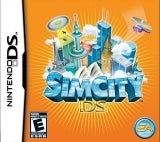One of the ten titles included in the canon of the videogame masterpieces that need to be preserved was none other than SimCity, voted at GDC 2007 by a group of industry veterans and academics as an outstanding example of game design. Undoubtedly one of the most-played PC franchises across its many incarnations, SimCity delivers a complex game experience that requires careful planning, organizational skills and even risk-taking. Building a city has never sounded so fun and challenging, and after a few hours spent dealing with pollution and public transportation, players will probably look at the city they live in with a new sense of respect. This applies to every installment in the series, including the new portable version that the Japan-based studio syn Sophia developed for the Nintendo DS. Too bad that this is the only positive aspect of SimCity DS, a title otherwise afflicted by poorly balanced controls and aesthetic design that's among the ugliest on the DS.
The core task in SimCity is playing the role of the mayor in a newly-created city and balancing the residential, industrial and commercial areas in a profitable but still environmentally sustainable way. If you manage to do this, good for you; if you don't, welcome to the real world and have a seat next to many well-known mayors. Managing a city is not an easy task and right when players think they've mastered it, new challenges are faced: should the taxes be increased to get more money for improvements, or lowered to attract more residents and businesses? Is it worth investing in parks and universities in order to encourage residents not to leave, or is it better to save money and buy a new environmentally friendly electrical plant whose benefits will show up in a few decades? There are deals to sign with neighboring cities, natural disasters to keep under control, funds to be invested in R&D and many, many other factors to keep in mind. Ending the fiscal year with surplus money is easy at the beginning, but it becomes harder as players choose more challenging stages with natural obstacles such as mountains and water.
The player's free will, typical of other SimCity installments, has been partially replaced by different advisors who won't be silent for a second. Although this is a helpful feature for beginners, experienced players might be driven crazy by the fact that this option cannot be deactivated. In the middle of some interesting building activity, the advisor will interrupt, introducing some citizen with a special request for the mayor. There are only a few types of citizens, and they will keep coming back asking for the same things. After building four -- four! -- stadiums in my city of scarcely 30,000 residents, I still had the firefighter Phil harassing me with requests for more stadiums. Each citizen has the same endless lines of dialogue that can't be skipped and the only reason why players will accept to meet them is because one of them might be Professor Simtown, the only useful character in the game, introducing some new invention by the R&D department.
Overall, SimCity DS is a simplified version of the deeper, hardcore PC installments. Many of the charts and statistics have been replaced with more casual-gamer features such as an opening test to determine which advisor is better for each player (whatever the result is, they'll annoy you anyway). Other DS-specific additions are the mini-games related to events and calamities, like the Christmas one in which players have to tap crazily on Santa's flying sleigh, trying to collect as many gifts as possible, resulting in more funds for the city. Whenever the population reaches a certain number, a fireworks mini-game activates: the mayor has to set them off as they appear onscreen, again being rewarded with money. In case of fires, players have to blow in the DS microphone to extinguish them. All these additions would have been nice in a children's game, but hardcore SimCity players will hardly welcome them, looking at them as a distraction from "serious" building.





 Average
Average


